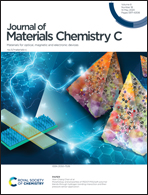Tunable photoluminescence from YTaO4:Bi3+ for ultraviolet converted pc-WLED with high chromatic stability
Abstract
To avoid color drift WLEDs at high temperatures, it is important to develop color stable luminescent materials. Herein, we have reported a phosphor YTaO4:Bi3+ with stable blue emission upon ultraviolet excitation even during the temperature changes between 300 and 480 K. Upon excitations into host absorptions, tunable blue emission can be observed from 400 nm to 450 nm due to the enhanced energy transfer efficiency from the host to bismuth ions as the concentration of bismuth increases. As the excitation scheme is modulated between 355 and 370 nm, white emission can be achieved in YTaO4 singly doped with Bi3+, which has rarely been reported previously. As a proof-of-concept study, prototype WLEDs have been developed with phosphor YTaO4:Bi3+ and 365 nm InGaN chips under different driving currents. Our findings make it possible to develop single-phase white light-emitting phosphors activated by single Bi3+ ions for WLEDs and can also inspire the development of WLED devices with high chromatic stability.



 Please wait while we load your content...
Please wait while we load your content...